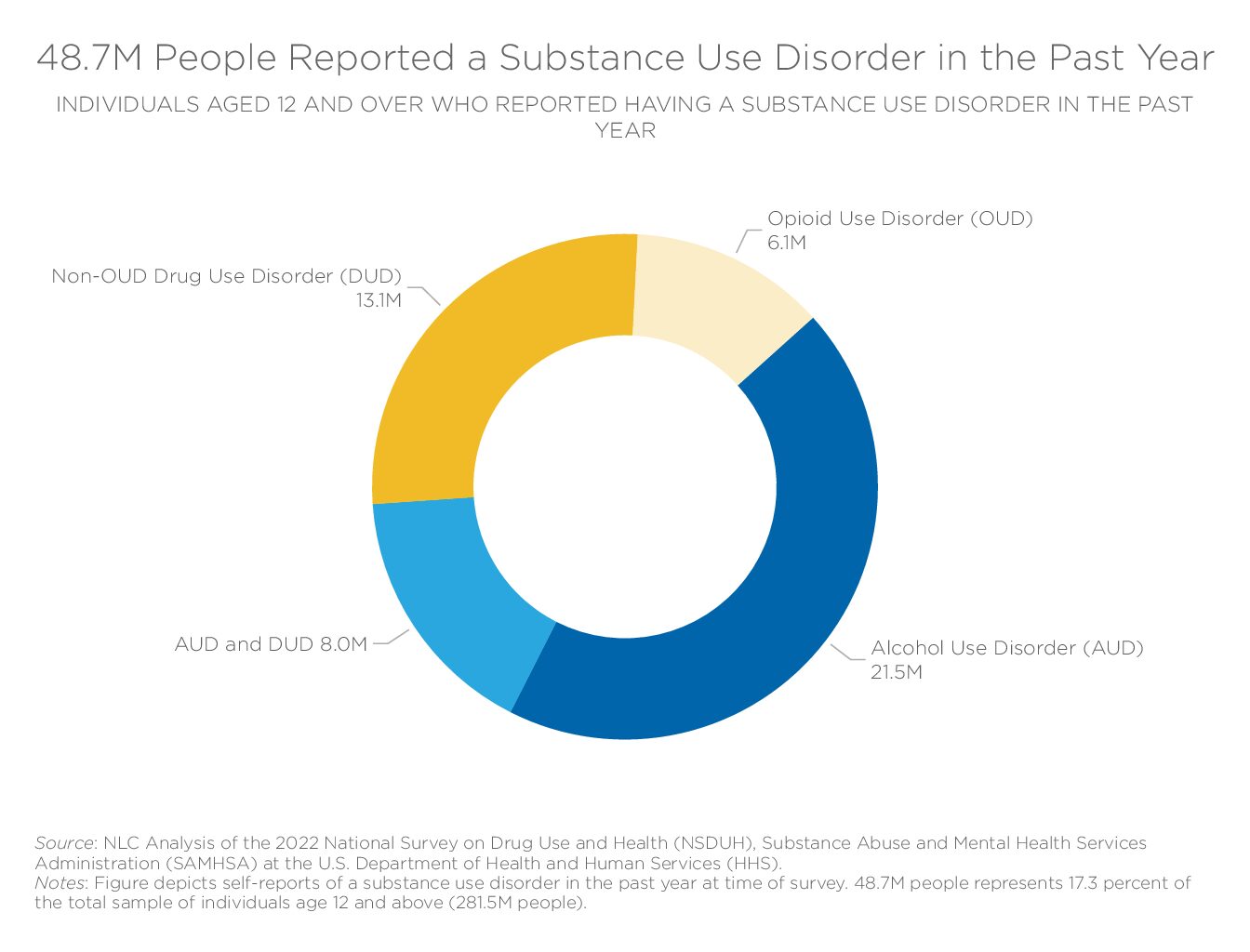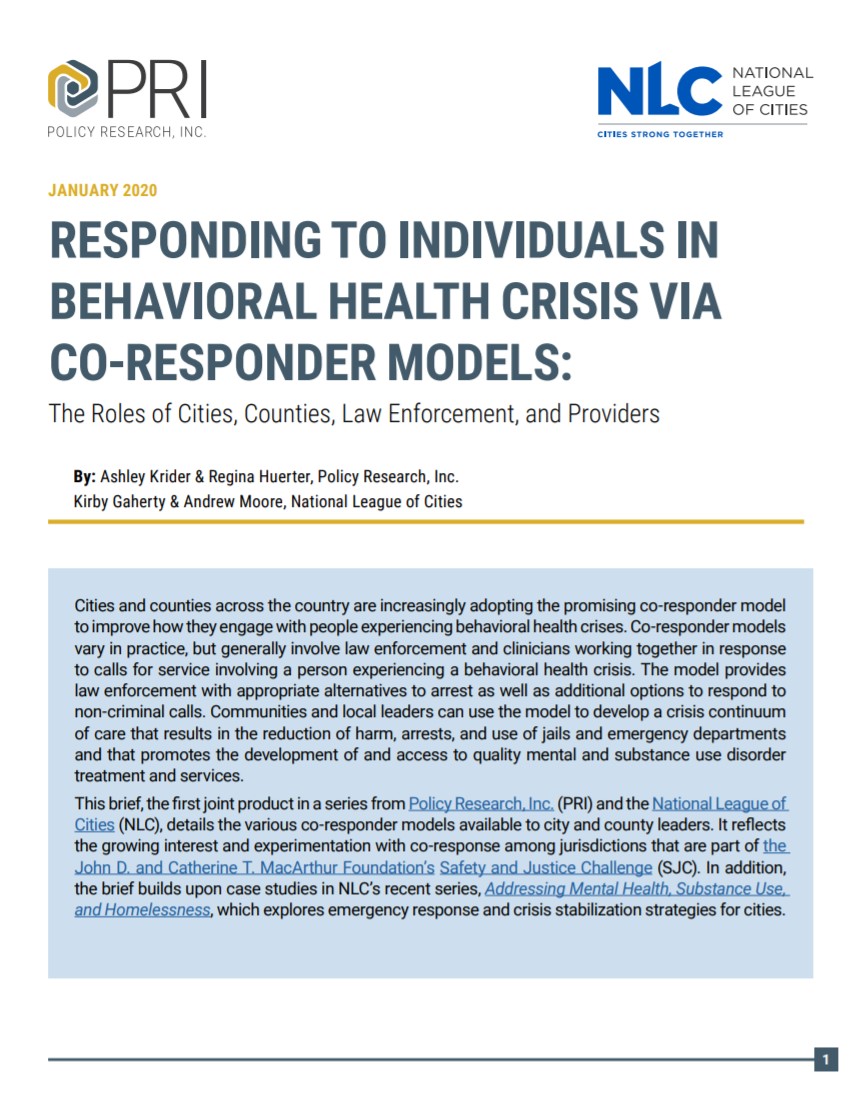In many places across the nation, cities, towns and villages have been ground zero for addressing substance abuse and mental health challenges, including the opioid epidemic. According to the Substance Abuse and Mental Health Services Administration (SAMHSA) at the U.S. Department of Health and Human Services, 48.7 million people aged 12 or older (or 17.3%) had a substance use disorder (SUD) in the past year, including 29.5 million who had an alcohol use disorder (AUD), 27.2 million who had a drug use disorder (DUD), and 8.0 million people who had both an AUD and a DUD. Among people aged 12 or older with a DUD in the past year, a little over 1 in 5 (6.1 million people) had an Opioid Use Disorder (OUD). NLC is committed to supporting communities and their leaders by providing resources, action-oriented solutions, and legal advocacy on behalf of local governments as they continue to lead the way in addressing our nation’s substance use crisis.
This page will continue to be updated with additional NLC-driven resources as they are published. With questions, feedback, or ways your city can get involved in NLC’s efforts, please contact substanceuse@nlc.org.

“Fentanyl, opioids and other intoxicants remain a significant national concern, and it’s essential to acknowledge that numerous cities are grappling with a spectrum of substance abuse challenges. Strong partnerships and innovative solutions are essential to addressing these challenges, and the National League of Cities is leading the way to give cities the tools, the learning opportunities, and the partnerships to support the residents in our nation’s communities.”
Mayor Victoria Woodards, Tacoma, WA
Federal Advocacy
NLC has called on Congress and the Administration to ensure that funds appropriated for substance abuse, treatment, prevention and recovery programs are accessible to cities, towns and villages. Together, local and federal government can drive back the tragic effects of our nation’s substance use crisis, including the fentanyl/opioid epidemic, in our communities by providing local leaders with the necessary direct federal resources to address this crisis.
For additional information, see NLC’s Federal Advocacy Action Agenda.
“The National League of Cities provided Huntington a platform that validated our efforts to combat the opioid epidemic. Because of this partnership, my city was able to overcome the label of being the epicenter of the opioid epidemic and, instead, has become known as the epicenter of the solutions to the epidemic. As a result, our city is acknowledged as ‘The City of Solutions.’ Our residents now square their shoulders with confidence rather than dropping their heads in shame.” – Mayor Steve Williams, City of Huntington, West Virginia
Related Resources
Check out NLC’s resources, including high-level blogs, in-depth research briefs, podcasts, and more. For additional resources and publications, visit NLC’S Resource Library.
The Opioid Epidemic and the Role of Local Leaders
- A Prescription for Action: Local Leadership in Ending the Opioid Crisis
- Supporting Residents in Recovery with Tom Coderre
- Fighting the Opioid Crisis with Mark & Alison Hayes
- Addressing the Opioid Epidemic Together
- Mayors’ Institute on Opioids: Aligning City, County and State Resources to Address the Opioid Epidemic (PDF)
“Litigation seldom completely solves societal problems. Those problems are solved by the commitment and work of people on the front lines. With tools like the National Opioid Settlement Dashboard, NLC is helping our communities get the support they need to combat the opioid epidemic. NLC provides extensive resources that offer tangible, evidence-based solutions, best practices for collaboration, and comprehensive data to support meaningful treatment and recovery efforts that, in combination with Arkansas’ unique city-county partnership, is helping to end the scourge of opioid addiction.”
Mark Hayes, Executive Director, Arkansas Municipal League
Frequently Asked Questions
How does NLC inform its federal advocacy positions related to substance use, mental health and public safety?
NLC’s federal advocacy positions are adopted by the full membership at the Annual Business Meeting at the NLC City Summit. The policy development process is dynamic and inclusive, encouraging NLC members to identify emerging topics of immediate and long-term consequence to the nation’s cities and towns and allowing them to develop standing positions and advocacy strategies. Every year, members may submit amendments to standing policy and propose resolutions addressing timely issues or specific pieces of legislation. Submissions are then forwarded to the policy and advocacy committees of jurisdiction for review and consideration. The National Municipal Policy is available online.
How has NLC participated in legal advocacy on this topic?
Through our legal advocacy efforts, NLC has filed amicus briefs in federal cases that are related to the opioid epidemic when there is a strong local interest at issue. To learn more about NLC’s legal advocacy program and how it supports local government interests in areas like the substance use and public health and safety, see this resource page.
How does NLC support local solutions and policy recommendations for cities, towns and villages?
NLC’s technical assistance and research are backed by evidence from trusted health experts, as well as our own experiences with cities through Technical Assistance programming. We present local solutions for cities that are backed by research and data, and we know that addressing substance use challenges in municipalities is not a one-size-fits-all solution.
How does NLC’s Substance Use: Supporting City Solutions work intersect with other program areas?
The nation’s substance use challenges impact many areas of municipalities: workforce and economic development, health and wellbeing, public safety, and public health more broadly. NLC is committed to producing opioid resources that address the intersectionality of this crisis.
- Some of those intersections can be found in NLC’s current initiatives, including:
- Cities of Opportunity
- Economic Mobility and Opportunity
- Improving Community Health and Resilience through the Arts
- Reimagining Public Safety
- Mental Health, Substance Use and Homelessness
- Connecting Adults to Postsecondary and Workforce Success
- Housing and Community Development
- Improving Community Health and Resilience Through the Arts
How can I get involved in the work around NLC’s Substance Use: Supporting City Solutions?
Reach out to substanceuse@nlc.org with questions, feedback, or ways to get involved.
NLC sends out updates on key resources and events via email. You can sign up to receive NLC communications and newsletters here.













